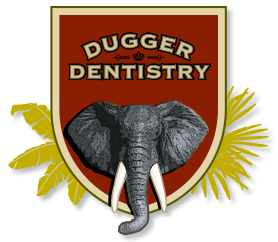Preparing Your Oral Health For Retirement

As we age, our mouths and teeth change a lot over the years. Whether in kindergarten or preparing for retirement, maintaining a healthy, great looking smile means staying committed to practicing quality oral hygiene at home and scheduling regular visits to see the dentist. Much as planning for your golden years requires focusing on the big picture, protecting your oral health means planning ahead with Dr. Dugger.
For too many adults, tooth loss is viewed as an inevitable part of growing older. However, there is no reason why we need to lose our teeth and wear dentures as we enjoy our senior years. If we maintain a healthy, proactive approach to dental care, our teeth can and should last a lifetime.
Unfortunately, studies have shown that many adults don’t pay their oral health the attention it deserves. Just 51 percent of adults brush their teeth twice a day, and only 40 percent floss daily This helps to explain some truly troubling statistics.
Nearly all adults 65 and older have developed at least one cavity, with 1 in 5 dealing with untreated tooth decay. When it comes to gum disease, approximately 68 percent of seniors have some form of the disease. Whether early stage gingivitis or the more advanced periodontitis, gum disease for seniors represents a significant risk to their oral health. Around 61 percent of seniors over the age of 75 have moderate or severe periodontitis, which can lead to the permanent tooth loss that requires the need to wear dentures.
In the end, it seems like a self-fulfilling prophecy. People expect to need dentures as they grow older, and when they don’t do enough to protect their long-term oral health, they end up experiencing the tooth loss they always expected.
Fortunately, you can avoid the type of common oral health problems that make it difficult to enjoy your golden years by taking a few precautions well in advance of your retirement.
Make a Commitment to Preventative Dental Care
To enjoy a lifetime of healthy teeth and gums you must make a lifetime commitment to preventative dental care. This means brushing twice a day for at least two minutes and flossing daily. This means buying a new toothbrush once every three months, and using toothpaste that contains fluoride. It also means scheduling regular dental care with a family dentist.
While a lot of people don’t enjoy visiting the dentist, the practice of having your teeth regularly cleaned and inspected offers incredible value, not only to your oral health but to your wallet as well. Regular exams by Dr. Dugger allow him to spot the early signs of gum disease and tooth decay while still easily treatable. When dental decay and disease is allowed to progress unchecked, it leads to the need for far more expensive procedures to treat.
There’s a reason why most dental plans pay for two dental cleanings a year. Insurance companies know that paying for preventative dental care is far cheaper than having to pay for treatments like fillings, root canals, implants and dentures that result from a history of poor oral health.
By taking the time and making the effort to ensure your teeth and gums don’t start to deteriorate, you set the foundation on which a lifetime of quality oral health becomes possible.
Eliminate Poor Lifestyle Habits
While preventative dental care plays a large part in determining how your teeth and gums age, so too does many of your lifestyle habits.
Smoking ranks as the most destructive habit you can have when it comes to your oral health. Not only does smoking increase your risk for oral, throat and lung cancer, the habit also increases your risk for developing tooth decay and gum disease.
Studies have shown that smoking helps contribute to plaque growth. Plaque – a sticky biofilm that’s closely linked to the development of cavities and gingivitis – thrives in the mouths of smokers, as does foul smelling bacteria that causes persistent bad breath.
Diet also makes a significant difference in helping maintain a healthy smile for a lifetime. Diets high in sugar provide plaque with plenty of the fuel it needs to produce harmful substances that attack our tooth enamel. By cutting back on artificial sugars and adding more fresh fruits and vegetables to a diet, you can lower your risk for tooth decay and further help to strengthen the foundation of your oral health.
If you have any questions about the best ways to help ensure you enjoy a healthy, great looking smile well into your golden years, feel free to ask Dr. Dugger during your next appointment.
